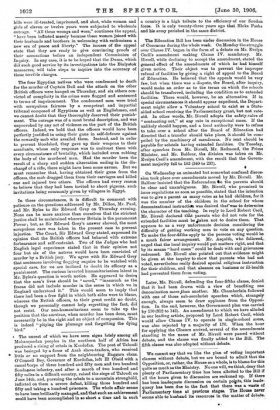On Wednesday an animated but somewhat confused discus-
sion took place over amendments moved by Mr. Birrell. Mr. Balfour insisted that the Referendum to the parents should be clear and unambiguous. Mr. Birrell, who promised to issue regulations as soon as possible, stated that the intention was to give a parent as many votes as he had children, for it was the number of the children in the school for whom• denominational instructidn was desired thaewas to determine the character of the teaching. In reply to Lord Robert Cecil, Mr. Birrell declared teat parents who did not vote for the extended facilities must be taken not to desire them. That appears to us a very unfortunate decision considering the difficulty of getting working men to vote on any question. To make the four-fifths apply to the persons voting would be a much fairer arrangement. Mr. Asquith, who followed, urged that the local inquiry would put matters right, and that by its means "hard eases" could be dealt with and grievances
redressed. Mr. Birrell also pointed out that evidence might
be given at the inquiry to show that parents who had not voted, nevertheless really desired special religious instruction for their children, and that absence on business or ill-health had prevented them from voting.


























































 Previous page
Previous page